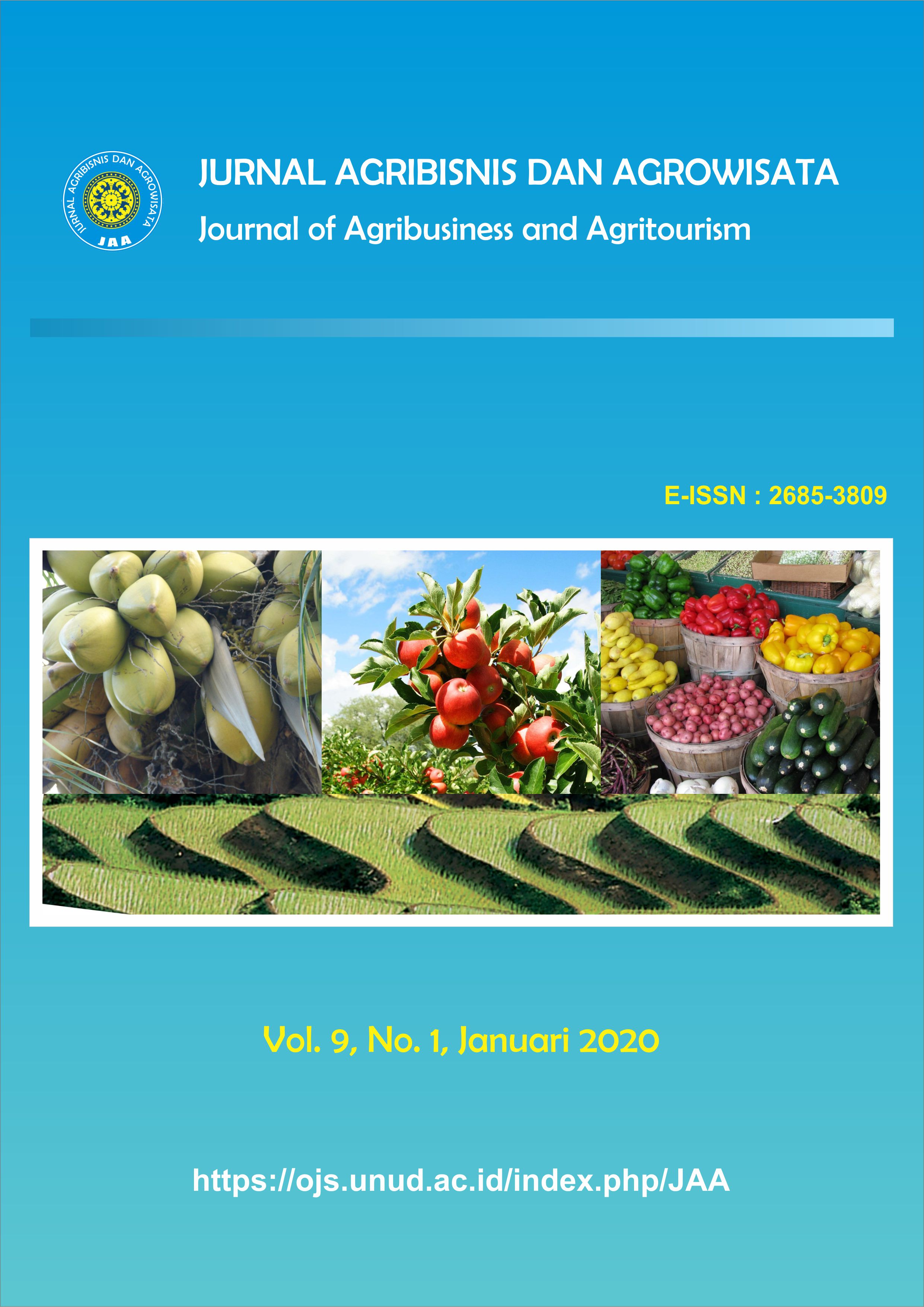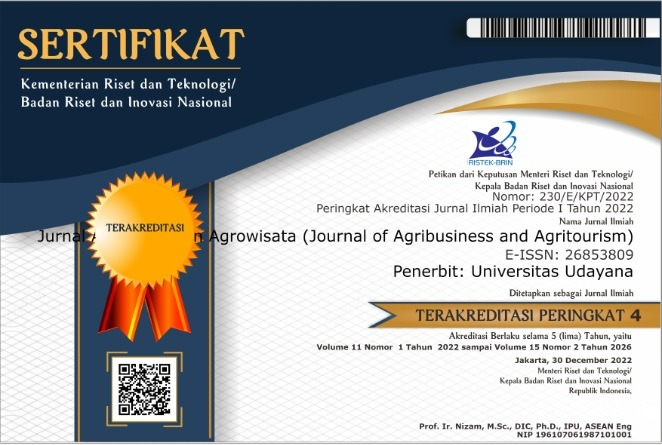Strategi Mewujudkan Ekowisata di Subak Intaran Barat, di Kecamatan Denpasar Selatan, Kota Denpasar
Abstract
Strategies for Realizing Ecotourism in the Subak of West Intaran of South
Denpasar Sub-District, Denpasar City
Institutional development is a very important component in the success of agricultural
development. Institutions that have an important role in agricultural development in Bali
are the subak system. At the present day, Subak faces a serious challenge to maintain its
existence. One of the concepts offered to overcome the problem of subak is through
integrating agriculture with tourism. The synergy between agriculture and tourism is
developed for example through various forms such as agrotourism and ecotourism. One
subak that embraces the concept of ecotourism but still needs to be developed is the
Subak of West Intaran.
This study aims to determine the potential of Subak of West Intaran and the strategies to
realize the ecotourism. Data collection was conducted through in-depth interviews and
questionnaires through six key informants. Then the data were analyzed using the
SWOT analysis method and IFAS & EFAS matrix analysis.
The results showed that Subak of West Intaran did not fully meet the 6A ecotourism
requirements and was in one quadrant with IFAS value of (1.56) and EFAS value of
(0.72) which means that West Intaran Subak is strong and has a high chance of being
developed into ecotourism. Recommendations that can be given to Subak of West
Intaran, namely the government need to affirm regulations to forbid the selling of
agricultural land, support for the preservation of subak must be given to all levels of
society, and the establishment of an Ecotourism Management of West Intaran Subak.
Downloads
References
Aktivitas Pertanian Padi Sawah (Kasus di Subak Dalem, Kecamatan Kerambitan,
Kabupaten Tabanan).Internet.[Jurnal_online]. E-Jurnal Agribisnis dan
Agrowisata.Volume 2.1 (2013): 1-11.ISSN:2301-6503 dalam
https://simdos.unud.ac.id/uploads/file_penelitian_1_dir/04f3b04b543da12cf0f8c5
1d4928b8af.pdf . Diakses tanggal 14 Februari 2018.
Astika, Wayan. 2015. Eksistensi Subak Dalam Menghadapi Tantangan Global di Era
Modernisasi. Internet. [Artikel Online] dalam
https://phdikarangasem.wordpress.com/2015/11/14/eksistensi-subak-dalammenghadapi-tantangan-global-di-era-modernisasi-oleh-drs-i-wayan-astika-m-siphdi-kabupaten-karangasem/.
Diakses
tanggal
12 Januari
2018.
Badan Pusat Statistik Kota Denpasar. 2017. Luas Wilayah Kota Denpasar Menurut
Penggunaan Tanah Per Kecamatan (Hektar). Internet. [Artikel_Online] dalam
https://denpasarkota.bps.go.id/dynamictable/2017/05/30/46/luas-wilayah-kotadenpasar-menurut-penggunaan-tanah-per-kecamatan-hektar-2012.html.
Diakses
tanggal 4 Maret 2018.
Hakim, L. 2004. Dasar-Dasar Ekowisata. Jawa Timur: Bayumedia Publishing.
Margono. 2004. Metodologi Penelitian Pendidikan. Jakarta: Rineka Cipta.
Prastowo, Andi. 2014.Metode Penelitian Kualitatif dalam Perspektif Rancangan
Penelitian. Yogyakarta: Ar-ruzz Media.
Sriyadi. 2016. Model Pengembangan Agrowisata Berbasis Kearifan Lokal (Studi Kasus
di Desa Kebon Agung Kecamatan Imogiri Kabupaten Bantul DIY). Internet,
[Jurnal_online]. E-Jurnal Agribisnis dan Pengembangan Pedesaan. Vol.2, No.2.
152-160.ISSN:2527-9338 dalam
http://journal.umy.ac.id/index.php/ag/article/view/2281/2251 . Diakses tanggal 17
Februari 2018.
Sugiyono. 2017. Metode Penelitian Kuantitatif, Kualitatif, dan R&D. Bandung:
Alfabeta.
Windia, Wayan. 2006. Transformasi sistem irigasi subak yang berlandaskan konsep Tri
Hita Karana. Denpasar: Pustaka Bali Post.
Windia, Wayan dan Wiguna. 2013. Subak Warisan Budaya Dunia . Denpasar: Udayana
University Press.







